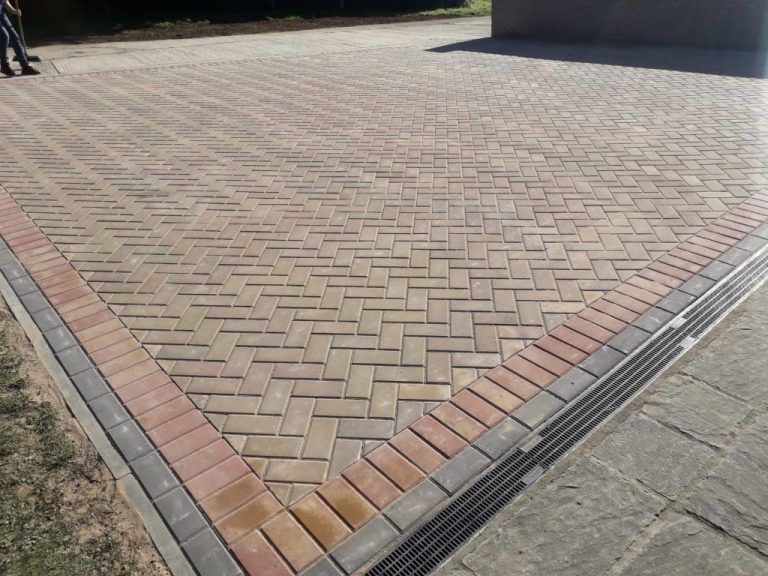
Heavy vehicle traffic, extreme weather conditions such as freezing temperatures, snow, ice, intense sun, and other factors such as engine oil, road salt, and gasoline can slowly deteriorate the condition of your driveway. It may take years, but your asphalt pavement would need to be repaired or replaced after a period. For high-quality paving services, you can search “paving companies near me” on Google to find suitable professionals that can make your driveway look as good as new.
How long does concrete pavement and asphalt pavement last?
Concrete pavement and asphalt pavement both have their pros and cons, and both are good options. Concrete roads are ideal for new construction, new roads, and areas that are subjected to extreme weather conditions or exposed to harsh natural elements. Concrete pavement is costlier than asphalt pavement but has a lifespan of 20-40 years. Plus, repairing concrete roads is also costlier since it often leads to the replacement of the whole slab. Lastly, concrete roads are riskier to drive on during snowy or rainy weather since it becomes more slippery.
Asphalt pavement is cheaper than concrete pavement and takes less time to build. Oftentimes, it only requires surface maintenance which leads to a lower repair cost. However, asphalt pavement is more susceptible to damage during extreme weather conditions which can lead to the development of potholes. Generally, asphalt pavement lasts for 15-20 years. It is more suitable for maintenance and road construction in rural areas.
What is asphalt paving?
Most people are familiar with the term ‘concrete’ but ‘asphalt’ may be a term that is unfamiliar to you. Asphalt is a mixture of aggregates such as crushed rocks, gravel, sand, and slag along with fillers and binders such as bitumen. It’s 100% recycled, durable, safe, and melts ice quicker than concrete. Porous asphalt contains tiny holes that qualify it for EPA best-practice paving.
Typically, asphalt paving is recommended to repair asphalt surfaces with potholes and major cracks. Minor defects can be fixed by overlaying a thin layer of hot asphalt over existing layers. However, for major defects such as cracking edges, pooling water, and potholes, complete resurfacing may be required.
What’s the difference between asphalt paving and sealcoating?
Sealcoating is a method to protect asphalt pavement from traffic wear, harsh weather conditions, oil, fuel, water, and prevent damage to new and old asphalt pavement. Sealcoating is performed by applying specially formulated liquid made from petroleum products or refined tar over asphalt pavement to prevent damage due to water penetration, chemicals, and sun damage. It’s a method to maintain the condition of asphalt pavement instead of repairing them.
Types of asphalt damage
Without proper maintenance, asphalt pavement can get damaged more quickly over time. It’s crucial to fix the damage as soon as you notice them to save cost and repair the problem quickly. Here are few common types of asphalt damage that you should look out for:
1. Potholes – Potholes are common during the early spring or late winter when water frequently goes through the freezing and melting cycle. If not taken care of promptly, they can damage the base of the entire pavement. Potholes can be minimized or avoided with preventative maintenance.
2. Cracks – Cracks can form on asphalt pavement due to a variety of factors and take many different forms. Some of the most common types of cracks include the following:
- Block cracking
- Alligator cracking
- Transverse cracking
- Slippage cracks
- Longitudinal cracking
- Edge cracks
3. Depressions – The areas of an asphalt pavement surface that have lower elevation and hold water are known as depressions.
4. Stripping – Stripping occurs when the bond between the aggregate and the asphalt is weakened. As a result, the surface starts to dislodge, and cracks start to form frequently.
5. Base failure – A lack of support, too much weight in a specific area, or poor drainage and collapse of the base of the asphalt. It is necessary to remove the entire surface layer in order to fix the sub-base.
Preventative maintenance tips for asphalt pavement
The overall lifespan of your asphalt pavement will increase if you perform regular preventative maintenance on the surface. Here are a few tips you may follow to extend the lifespan of your asphalt pavement:
1. Repair potholes quickly – When water enters the ground under the pavement, it is subjected to contraction and expansion which results in the formation of potholes. If potholes are not repaired promptly, it can easily spread and cause further damage to the point of reducing the integrity of your entire asphalt surface. As a result, it would decrease the safety of driving on such roads and increase the cost of repairs.
2. Keep it clean – It’s crucial to clean your asphalt pavement regularly to extend its lifespan and keep it in good condition. Regular cleaning allows you to clear garbage and remove debris that can slowly chip away at the durability of the asphalt pavement. It’s especially vital to remove oil and fuel stains as quickly as possible since these degrade the surface of asphalt pavement. You can remove such tough stains using a degreasing cleaning agent that is specially made for use on the surface of asphalt pavement.
3. Apply sealcoating – The power of sealcoating cannot be underestimated since it covers the asphalt pavement with a protective layer that keeps the surface looking fresh and prevents deterioration due to external factors. The benefits of sealcoating are as follows:
- Accelerates the melting of ice and snow.
- Protects pavement from chemical spills, oxidation, water penetration, oil.
- Prolongs the life of the pavement.
- Enhances the appearance of the property.
Typically, sealcoating lasts about 3-5 years on new asphalt pavement that is in good condition. However, if the asphalt pavement is old, it may require annual sealcoating for appearance and protection.
Conclusion
If you notice that your driveway is filled with cracks or potholes, don’t wait any longer for the condition to get any worse. Search “paving companies near me” online to find professionals who can help repair or in the worst-case scenario, replace your driveway to make it as good as new.
